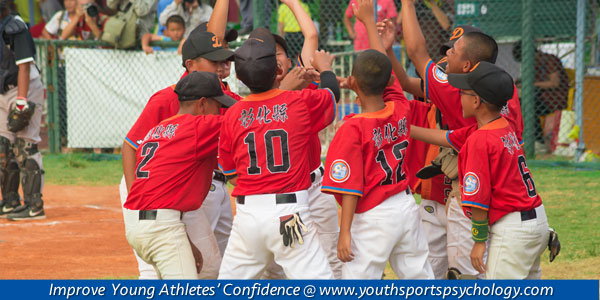
Self-Talk And Confidence in Youth Sports
A sports dad who wrote us recently understands exactly why negative self-talk crushes confidence. Even in a talented athlete. However, he has no clue how to stop the downward spiral that such self-talk produces, he says.
Read on to learn about why negative self-talk is such a confidence killer—and how you can help your young athlete overcome this challenge.
When kids embrace negative self-talk, they use negative words to describe their abilities when they’re carrying on inward conversations with themselves. They also do it when they’re talking to others. They say things like, “I stink,” or “I can’t take a shot today.”
This sports dad’s 16-year-old daughter is a great example. She trains twice a day in Netball in Australia, he says. She’s physically fit and has excellent technical skills. She even has experience competing in triathlons.
“The problem is when she trials for the state team she starts to get the self-talk that says she is not good enough, and starts to have self doubts. She then starts to have fear of failure. This then causes her to make mistakes which then reinforces the self talk and self doubt.”
When the dad talks to her about her self-talk, she understands what she’s doing wrong. “But she says she can’t stop this self-talk,” he says. “Is there some way we can stop this so that she can remain confident and play her natural game?”
This dad explains this problem so well. Even when kids know they’re committing this mental-game no-no, they don’t know what to do. They can’t stop the negative thoughts or statements that jump into their head.
We’re here to help.
First, watch what you say to your young athletes.
You want to especially avoid broad-ranging negative statements like, “You always freeze up before a game.” Kids will often start repeating such statements to themselves.
Second, watch how your kids talk to themselves and about themselves.
Do this especially after they make mistakes. You might hear them say, “I really stink,” “I always miss that shot,” or “My left-hand passes are horrible.”
Point out that they’re using negative self-talk.
Third, ask your kids to identify typical negative statements they use when talking or thinking about sports.
Fourth, ask them to reframe such statements.
That means they need to come up with a positive statement for each negative statement. The positive statement should focus on their positive attributes–their training, coaches, mental game, teamwork or talent.
If your kids struggle with this and other challenges that hurt their confidence, we’ve working on a brand new program for you.
It’s called “The Confident Sports Kid: A 7-Day Plan for Building Self-Confidence in Young Athletes.”
It includes a guide for parents and coaches, a workbook for young athletes, and more. For now, we’d like you to send us your comments or experiences about self-talk or anything related to confidence.
Do your kids struggle with negative self-talk? What do they say? How do you deal with it? What other issues bust your kids’ confidence? Please post your comments below.
We look forward to hearing from you!
Related Articles on Youth Sports:
- How Self-Talk Can Help Athletes When Losing a Game
- Ensure Young Athletes’ Self-Talk is Positive
- When Youth Sports Feels Toxic, Athletes Need These Skills
*Subscribe to The Sports Psychology Podcast on iTunes
*Subscribe to The Sports Psychology Podcast on Spotify
Help Your Young Athletes Improve Focus In Sports!

Are your young athletes easily distracted by people shouting on the sidelines? Do they obsess over their mistakes? Do they worry about what people think of them?
These issues will cause their concentration and performance to suffer!The Focused Sports Kid helps kids overcome distractions that can hurt their performance in sports.
The Focused Sports Kid program is actually two programs: one for sports parents/coaches that provides mental game tips especially designed for parents and coaches, and for young athletes, ages 8 to 12, that will walk them through 7 simple lessons in mental focus in sports.

Great advice, my kids play golf, and soccer, and Im always writing in their facebook affirmative self talk, and yes, I try hard to put the words that I talk with them in a reinforcing way, Im part of the their system , and Im here to help.
Sergio Chihuahua, Chihuahua, Mexico
I have a difficult situation with our son. He is 18 years old, a competitive swimmer and a member of a varsity team with the University. He has been swimming for 11 years now and his swim career has been very difficult. He has always been a perfectionist and an excellent student. He has developed excellent time management skills that balance school and swimming. He is very talented in swimming and has done very well. He has qualified for many senior events and even won a spot on the Canada games team.
Because of his commitment to school, he frequently misses many swim practices and has a poor attendance record; however he makes up for it with personal training. This results in his great performance at swim meets while appearing not to be putting in the same training effort as other swimmers. The other swimmers have become jealous and angry at his accomplishments as they feel he doesn’t deserve them. He has had to deal with bullying and abuse from his team mates and even his coaches. During one meet, his coach called him a slacker, an uncommitted swimmer and lazy. My son then proceeded to do very well at the meet swimming faster than all his team mates. The coach was embarrassed and told him off. The coach told my son he didn’t deserve his times and should not have done so well. His team mates attacked my son in many different ways. Two boys urinated in my son’s locker, others would spit on him. All this was done as they felt he shouldn’t be doing well due to his lack of attendance.
We had to switch our son to four times to different clubs just to get him away from the negative environment. Finally, our son made it to the varsity team at university, but the damage from all the negative events have caused our son to believe that perhaps he is a loser and lazy. He still misses training to study for exams, but his varsity coach understands the need for studying. Our son is not swimming as well as he could as he fears that getting faster will cause a repeat of what happened at the swim clubs.
How do we get our son to overcome the memories and bad thoughts of what happened to him? He has so much potential, but is afraid to use them and has so many negative thoughts about himself now.
Ironically, my sons both are swimmers and both can and have achieved great successes at different levels. My oldest is a senior level swimmer and is “consistently inconsistent”…shows the deer in the headlights syndrome. My youngest is a perfectionist and although he trains like a champion, he gets on the blocks and voila…all his practice, his physical memory, his belief…blow up! It doesn’t matter what we say, how we say it, self doubt seems to creep in. Both boys start with oodles of confidence, or perhaps “false bravado” even perhaps, their own versions of self confident talk but as the time moves on and the races get closer…they slowly unravel.
We have tried a positive approach, frustrating negativity (admittedly), encouragement to try other things and positive silent support…we have tried to build confidence and talk with coaches (build a support plan)…How do these guys find their personal comfort zone, their positive space…their competitive edge? Both have what it takes physically….but will their heads get in the way?
You have to find out what’s causing the doubt to errupt at the wrong moment. Other factors might be at play during competition such as the fear of failure, which is very common with perfectionists.
It’s wild how some of the comments above match my daughter perfectly. She is an outstanding athlete and student as well. She plays 3 sports and has (or shows) a high level of confidence in herself. In Volley Ball and Softball she excells and has no problems with her confidence. She will serve bullets that just clear the net or will be down in the count only to throw 3 strickes in a row. In Basketball she dominates in scrimmages during practice and can shoot 3 pointers better than anyone in her school including the young men. When she gets on the court during her BBall games she gets that Doe in the Headlights look and plays poorly, rarley taking a shot. I have tried everything to help her but I am at the point where I don’t know how to help her through this. How do I get her comfort level back when she is on the court?
There are a lot of issues a play so the answer is not easy. She has some fear of failure. Confidence and trust are part of the issue too. You have to start by finding out what type of fear of failure is holding her back and go from there. Is she afraid of making mistakes and embarrassing herself, for example? And what causes the doubt at game time?
hi everyone, hi mr partick. i m from turkey, tennis coach. my student is 15 and he has shadow fear. when is coming ball and he has to shut, if he sees his shadow ball is lost, if he doesn’t, balls go very good. he was leader of his age but 5 month age it finished. he s very sad about it. he thinks that his shadow is enemy of him. how can we help him to make good friendship with his shadow?? it s little bit funny but reality
thnx for attention.
I’ve seen this problem in golf, but not tennis. Who has enough time to look for their shadow in tennis? You have to react to the ball. It’s a matter of focus and he probably wants to see his form, which does not help.
My 12 yr old daughter plays softball. She pitches, and seems fairly confident in her abilities in the circle. In the batter’s box though, she is racked with the fear of failure. She subconsciously refuses to swing hard for fear of swinging and missing. Thus, she hits the ball regularly, but very rarely does she hit it hard. Her defense also struggles due to this same fear of failure. She is incredibly hard on herself and carries on constant negative talk.
I am very curious for your thoughts.
I am worried that all of this pressure she is exerting on herself will sap the joy she gets out of playing.
She’s afraid to make mistakes and this could be for many reasons, but the result is a swing that lacks trust and freedom. Perfectionists are very hard on themselves. You might look into The Fearless Athlete or our Kick Perfectionism Program, which is included in Kids’ Sports Psychology.